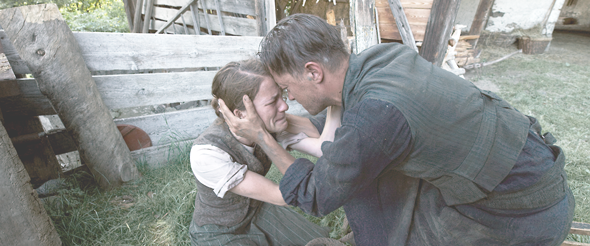Fourth and last column in a series

I cannot imagine someone viewing the film and yet not be moved to self-reflection. In the film, the only one who has some understanding of Franz’s courage is his wife. Apparently, in real life Franz’s wife, Franziska, greatly influenced Franz’s faith and Catholic commitment.
In classes in philosophy at St. John’s University, I stress that conscience is a habit and that it does not change easily. Concerning serious moral matters, some type of conversion would seem to be necessary to move from a selfish, self-centered life to a loving commitment to Christ.
One reviewer of the film suggested that the film could have more clearly explained or illustrated why, unlike most of his contemporaries, Franz refused to take the oath. When I read the review, I wondered how I might try first to understand Franz’s commitment and then how I might explain it to someone.
A quotation came to me. I believe it was from Franz Werfel’s book about St. Bernadette, who had apparitions of the Blessed Virgin at Lourdes. The quotation is the following:
“To those who believe, no explanation is necessary. To those who do not believe, no explanation is possible.”
I guess if I tried to explain Franz’s action to someone who had little or no understanding of why Franz would undergo suffering and death rather than sign an oath of loyalty to Hitler, I would have to say something about holiness.
The Risen Christ lived within Franz, and his relationship with Christ was so profound that he chose not to do what many of his Catholic contemporaries chose to do. Commitment to Hitler could not replace Franz’s commitment to Christ.
An indirect way that director Terrence Malick emphasizes the sanctifying power of the sacramental love that Franz and his wife share is by focusing the camera on the wedding ring on Franziska’s hand. In contrast, later in the film Malick focuses on what seems to be a wedding ring on the hand of one of Franz’s Nazi persecutors.
Shortly after seeing “A Hidden Life,” while reading a book, I came upon a favorite stanza from a Seamus Heaney play. The passage shed light for me on what I take to be the meaning of Malick’s film. The following is the stanza:
“History says, don’t hope
On this side of the grave.
But then, once in a lifetime
The longed-for tidal wave
Of justice can rise up,
And hope and history rhyme.”
I think what Heaney is saying is that there is enormous evidence in history that we should not hope because of all the evil we see, because of wars and crimes and other immoral actions. The so-called “facts” seem to be stacked up against hope.
Just look at the headlines in a newspaper. To hope can qualify someone as a dreamer, as someone who is not in touch with reality, a cockeyed optimist. But perhaps when we are on the brink of discouragement and even despair, something happens to restore and perhaps even strengthen our hope. We encounter a “tidal wave of justice” or an enormous goodness, or a love that seems more powerful than any evil. When that happens “hope and history rhyme.”
Of course, I am not certain what was on Heaney’s mind when he penned the words of the stanza, but for me, the deepest interpretation of Heaney’s stanza is the crucifixion and resurrection of Jesus.
Father Lauder presents two 15-minute talks from his lecture series on the Catholic Novel, Tuesdays at 9 p.m. on NET-TV.
After Jesus’ death, his followers were confused and frightened. Jesus’ mission seemed to be a failure. One of Jesus’ followers had betrayed him. How could God have allowed Jesus to be killed, and not only killed, but die as a common criminal? The temptation to despair must have been very strong. With Jesus’ resurrection, hope and history rhyme.
Something similar can be said about Franz’s death. Wasn’t it a futile gesture? For years, his courage and commitment were not appreciated by many. He was even mocked and called a traitor. His wife and children suffered greatly because of his decision to oppose Hitler.
What good could be drawn from his death? Because of Malick’s film, thousands of filmgoers will have their consciences challenged. Franz’s death, which looked futile to many during the Second World War, now can be viewed as a profound act of Christian hope, an act of hope that may inspire many. I think hope and history rhyme again.
